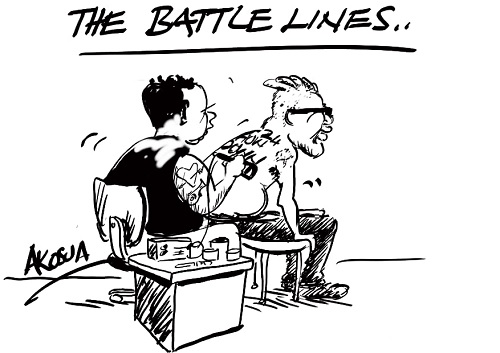
By Yao Afra YAO
These pre-schoolers are killing me with their graduation ceremonies! Take this nursery/kindergarten right next to my house, for instance. Come and see these tiny human beings, last two weeks Friday, busily waddling into their school compound, with adult music blaring all around them. Where are they going to? “It’s our graduation day!”
Yep, Graduation Day… So said the banner in front of the school with a tagline that read, ‘We made it!’
I almost died of laughter when I saw them later that day donning graduation caps and gowns.
France brings to mind, Greece
You know what, this whole attention that France is getting really brings to mind Greece. It only made sense for modern Olympic Games to find its first home in Greece—because this modern-day nation of Greece, as we all know, is in fact the ancient home of the Games. The facts surrounding this origin story are hazy. Many find its origins in myth— attributing the Games to Herakles, who was believed to have established them in honour of his father, Zeus. But it is well-established that these Games were a series of religious-cum-athletic festivals that were held every four years at the Temple of Zeus in the city of Olympia in Greece—from the period of 776 BC all the way to 393 AD.
Needless to say, there was no better place for the modern-day world to begin its Olympic journey than in this ancient nation itself. So, in the year 1896, the first modern Olympic Games was held in its capital city of Athens. Then came Paris, France in 1900; St. Louis, USA in 1904; London, UK in 1908. The list goes on. Essentially, what followed was a checkered journey of successes, mediocrities, and arguably, outright failures. Notwithstanding, hundred years later, the games were still going strong, and Greece was lobbying fervently to host its centenary. It made perfect sense—hundred years on, the Olympics finds its way back home. But alas, this was not to be; Greece lost the 1996 bid to USA—Atlanta.
108 years after serving as the Games first host, 8 years after losing out to the USA—in the year 2004—the Olympic Games was back home, in Greece.
Hey, You Asked for It
”We are proud of our victory and prepared for the challenge ahead. We will give the world the Olympics of their dreams. This is a promise Athens is destined to keep.” Gianna Angelopoulos, the woman who led the Athenian delegation said on the 5th September, 1997, the year that she and her team won for her country, the 2004 Olympic bid. Having lost the 1996 games to USA just a year prior, and the USA, having delivered a lukewarm Olympics, Greece was determined to prove to the world, first of all, that it had made a mistake denying it the centennial Games, and secondly that the Greek people were capable of inspiring awe—even amidst the environmental pollution, transport, security, and accommodation challenges it was then facing.
The country beat out its competitors—Italy, Sweden, South Africa, and Argentina by the end of the third round of voting. Helped, among others, by the fact that a competitor like South Africa, then under the leadership of the iconic Mandela, had promised its support to Greece upon its own elimination in the third round of the votes. A move that distressed some South African officials at the time. But many believed it to have been Mandela’s own strategy towards securing for his country, the next Olympics. You scratch my back I scratch yours. That did not and has not yet happened for the nation of South Africa. But enough about that; let’s head back to Greece.
”We saw, back in 1990, that our desire and heritage alone would not guarantee our election to host the Games. We realised that yes, we should improve our city. Yes, we should improve our environment. Yes, we should improve our infrastructure. It is a new bid for a new city.” Angelopoulos, leader of the bidding committee for Greece told the world upon her nation’s successful bid. So, like the French philosopher, Diderot, Greece went shopping!
The country promised itself and the world, among others, a new airport, subway system, roads, numerous sporting stadia and centres to house the various games, a reduction in pollution by 35%.
In fact, the country took this a step further by building and renovating these facilities even before placing their bid in 1997. A new airport was already built, so was a subway system, new roads, extensive renovations were done on the unapologetically dubbed Olympic Stadium, new swimming and basketball facilities were also built. “Athens earned the 2004 Games by putting forth a bid that pragmatically addressed its primary problems head-on and provided solutions. It has already built most of its Olympic facilities and has begun US$7billion worth of public works projects to allay concerns about pollution and traffic.” The New York Times, reporting on this victorious bid in 1997, wrote of Greece’s preparation. Indeed, Greece had worked hard for this bid instead of relying on the argument that they were owed it—that they were entitled to it—as they had done during their 1996 bid.
As Greece was patting itself on its back for this win, a certain Italian, Cristiano Brughitta, spokesperson heading a campaign against his own country’s potential hosting of the 2004 Olympics told the press, “I am absolutely delighted. I am just pleased to have spared our town this huge disaster.”
W-wait, what did he just say?! Why did he say that?
Cashing out or Cashing Out?
Of course, Greece had more spending to do. After winning the bid, the country went on to build more of these transport systems like tram and railway networks, bypass highways, walkways, stadia for sporting activities like baseball, volleyball, taekwondo, table tennis, field hockey, judo, swimming pools, canoe and kayak facilities; it undertook renovations to hospitals, railway systems, archaeological sites, stadia, etc.
The Olympics was estimated to have cost the nation a total of US$11billion—double its initial budget. And this only accounts for the cost directly associated with the games, not peripherals such as public works—infrastructure such as transport systems, healthcare, accommodation, security systems, etc. Three years after winning the bid, not much had been done by the nation in terms of preparation. So, Greece, it calls, once again on the leadership of Gianna Angelopoulos. She stepped in, having just four, instead of seven years within which to get her nation ready to host the 2004 event. Needless to say, not only was time doubly exerted to get the country ready for the event, but resources too. The Olympics ended up costing the country a lot, lot more than budgeted. So much so that the Vice President of the IOC, John Coates, in 2014, reminiscing on Olympic preparations, dubbed the Greek Olympic preparation, “the worst ever”.
But in all fairness, throughout modern Olympic history, one can see that Greece was, at the time, not alone in this—this trend of nation’s exceeding their budgets. Nations, eager to convince their populace to rally behind these bids always tend to underestimate the projected preparatory costs, only for the actuals to balloon exponentially.
But delayed preparation and bloated budget aside, the Greece capital of Athens found itself ready to carry out its opening event on the 13th of August 2004, and host the world through to the 29th of the same month—as scheduled. ‘Welcome Home’ read its motto to the world. And by the end of this three-week event, the world was in agreement that it had witnessed something special!
“We were the miracle, we showed a different Greece, a can-do Greece in four years instead of seven,” Angelopoulos reminisced on this feat. The then-President of the IOC, Jacques Rogge, even called the event an “unforgettable dream”. “Dear Greek Friends, you have won! You have won, by brilliantly meeting the tough challenge of holding the Games!” He said during the Games’ closing ceremony.
Dream into Nightmare
Three words: Unforgettable. Dream. Win.
For the whole world to come together in awe and appreciation of you—truly inspiring. B-but—not to rain on Greece’s parade—why did this Italian gentleman say this when his country, Italy, lost the bid way back in 1997: “I am absolutely delighted. I am just pleased to have spared our town this huge disaster”? Now, why would he say that?
To find answers, let’s both fast-forward and rewind to the year 2009—five years after the Olympics, and exactly 15 years ago. Because many experts agree that that year marked the beginning of Greece’s notorious financial woes.
But really, how do we get to 2009 without first visiting the country ten years prior—the year 1999? This tiny developed nation, finding itself in the year 1981, part of the EU, found itself almost excluded from another European-themed party, the Eurozone. Countries within the EU had come together, in 1999, to adopt a singular currency, the Euro—with the promise of boosting trade and investments for member countries. And Greece was at a risk of being excluded. Why? Well, because this ancient nation, at the time, had a debt-to-GDP level far above the 60% required by the EU to enter this Eurozone. Greece at the time, although a functioning developed economy, had an underlying fiscal problem of endemic tax evasion by citizens, corruption by government, dishonest budget deficit reporting by leadership, and an insistence by government to spend on social benefits and wages—even amidst low-income levels. This imbalance between spending and revenue undoubtedly caused an ever-increasing, unsustainable debt-to-GDP levels. And the EU, it wanted no part in that—at least not for its newly unveiled Eurozone.
So, Greece what does it do? Undertake a series of fiscal reforms—cut down on government spending and boost revenue by optimising its tax collection and administration, and systematically war against its endemic corruption? Oh no—not necessarily. Not especially after promising the world in 1997 that it was going to give it an unforgettable Olympic experience in 2004. Definitely not! So, Greece, it finds a problematic backdoor into this Eurozone. America’s leading investment bank, Goldman Sachs comes to the rescue, offering it a not-so-honest deal—currency swaps.
So, by the year 2001, Greece had found its way into the Eurozone—it had successfully adopted the Euro as its currency, leaving the drachma behind. Things start to look good. The promise of increased trade and investments is being seen by member countries—Greece inclusive. Its inclusion in the Eurozone means that this tiny nation is able to get its hands on more financing; more financing means more economic activities. Things begin to look good for the average Greek person. Mind you, the debt-to-GDP ratio had, at this point, skyrocketed to over 110%. But typical of a developed country, these debts were relatively cheap—especially riding on the back of fellow Eurozone superpowers like Germany and France as Greece was.
Things were indeed looking good for Greece, up until 2008 (four years after the Athens Olympics), when the US housing bubble burst wide open and caused a financial ripple effect that resonated not only in the USA, but countries worldwide—from Europe, Asia, all the way to Africa. The adverse impact on European nations came in varying degrees. Here you had this nation of Greece, very largely dependent on tourism and shipping, and highly indebted to one of those American banks at the forefront of the crisis, Goldman Sachs… Needless to say, this country was hit the hardest. Tourism and shipping were at an all-time low; meaning Greece’s GDP was at an all-time low—while its indebtedness remained at an all-time high. Globally, the cost of borrowing skyrocketed. Greece was sinking further and further into debt. Worse, being tied to the Eurozone, the country could not attempt stabilising its currency through the printing of money to service its debts.
All it ever takes is a global economic crisis to expose a country’s own obscured internal crisis, doesn’t it? Needless to say, in the year 2009, the shroud was lifted on Greece, and Greeks came to find that their budget deficit was not standing at 6.7% as reported by the government, but rather, it was more than twice that—15.6%. The country’s credit rating dropped to “junk” grade.
By 2010, its debt-to-GDP ratio had increased from the 110% recorded in 2001 to 127%. Its credit rating dropped even further. Its fate linked to those of the entire twenty members of the Eurozone, these member countries—chief among them, Germany and France—began to grow uneasy. A floundering Greek economy could only spell doom on the entire Eurozone. So together with the European Commission and the European Central Bank, collectively forming what came to be termed the Troika, they came to Greece’s rescue—bailing the country out with a sum of €110 billion. Greece was to use the money to service its debts to creditors (which, funnily enough, largely comprised Germany and France themselves). 91% of this bailout money was paid back to Germany and France. All the while, the government was expected to, under this deal, increase taxations on its already-struggling citizenry, and cut down on government spending. Austerity all the way!
But to their dismay (the Greek government’s and Troika’s), the opposite was becoming true… Instead of causing a fiscal balance through this reduction of debt, what these austerity measures were causing instead was a reduction in output—in GDP. As a result, debt-to-GDP ratio rose from 127% in 2010 to a whopping 172% in 2011.
The Troika, it came with another approach. Why don’t they bail out Greece with another €130 billion, but this time around, negotiate with the country’s creditors (once again, which largely comprised Germany and France) to slash down Greece’s debts by 53.5%—a ‘haircut’ on Greece’s debt burden. This was to still go hand-in-hand with the austerity measures—of increased taxes and reduced government spending (wage cuts, massive layouts, etc.)). This was sure to bring a different result, wasn’t it? So, there you go, in the year 2012, Greece, presented with the largest debt restructuring, then, ever recorded in modern history. But mind you, this time around, 100% of the bailout money was to go in service of the country’s debts to its creditors. Greece’s books start to see an uptick—at the expense of the people, that is.
But not for long.
Because you cannot starve the people for long. The Greek people had grown tired of these periods of austerity—where the cost of living was incredibly high, unemployment rates high, wages ridiculously low, and their tax burdens even higher. In January of the year 2015, the Greek people, for the first time in over 40 years, said ‘no’ to their two main political parties, and voted a third force into power. The promise of this new government? To take the country out of this ‘self-imposed’ austerity—renegotiate the Troika deal. In fulfillment of this promise, on the 25th of June of that same year, a referendum was announced, where the people would get to vote for or against a third proposed Troika bailout programme. But even before the Greek people could vote on Sunday, 1st July 2015, by the end of June, the country, having not yet signed on to this third bailout package, found itself unable to service its debt repayment of €1.6 billion to the IMF—the first developed country to ever miss out on an IMF payment. The people were happy with the results of their referendum, but their creditors, not so much, the consequence.
What followed were periods of banking and stock exchange shutdowns and more economic hardships. An abandonment of this nationalistic, anti-austerity stance was inevitable. So, on 12th July of the same year—just 11 days after the referendum—the Greek government found itself with its tail between its legs, back to Troika once again, pleading for a bailout. €86 billion this time around. Back to austerity, it was. In the year 2018, Greece finally completed this bailout programme. Yet, its debt-to-GDP ratio did keep rising—standing at a whopping 181% by that same 2018. Poverty has been endemic—with a recorded one in every three citizens living in poverty or the threat thereof.
Experts report a rebound. In the year 2023, for example, the country was said to have recorded a real GDP growth of 2%, and this is projected to further increase to 2.2% by the end of 2024. Yet, many Greeks insist that they are yet to feel these positive numbers in their pockets. Many Greek people who emigrated out of the country during the height of the economic crisis insist that they remain unconvinced with these so-called positive numbers.
From all indications, Greece had its financial woes coming. So then, why the finger-pointing to the 2004 Olympics whenever the issue of the Greek economic crisis is brought up? Well, one can argue that it is because just like the nursery and kindergarten school children close to my house, Greece had been caught publicly having fun, you see…
Na Who Cause Am?
The nation of Greece had been lying to itself. As mentioned, this trend of Olympic hosts underestimating the projected costs of the Games just to convince themselves and their citizenry to rally behind their hosting cause is by no means peculiar to Greece. Canada, Russia, South Korea, all did the same, years before Greece; China, Brazil, Japan, also did the same, years after Greece. The list is long.
Yet, for Greece, this lying to self had started way before the 2004 Olympics. The country, as noted, had a long history of politicians sweeping the nation’s problems under the carpet—under-reporting on its budget deficit and the like.
We can see here that as the country was almost being denied entry into the Eurozone in 1999 owing to its economic unsoundness, it was, during that same period, busily entreating the world to let it host a very costly event, the Olympics. And in fact, it did manage to convince the world.
Like certain spouses in rocky marriages, the Greeks had mistakenly convinced themselves that bearing a child together would solve their problems. Greece had incorrectly thought that by merely showcasing itself to the world, it would, in turn, be boosting its tourism sector—one of its main economic activities. So, there the country went—on a borrowing and shopping spree, taking from here and there, with the hopes that they would be reaping from here and there, enormous benefits on their investments. Which, on its face, is true. It is only by actively sowing that we can expect to reap results. No?
But here is the caveat: the country Greece, it seemed, had been sowing on thorny grounds. Greece had been lying to itself all along, doing a whole lot wrong, yet betting on this general principle of life (this principle of sowing-cum-reaping). Greece had been polishing on dirt—holding on to certain systematic economic mismanagements and corruptions, yet expecting to reap the full gains of certain economic imperatives. The country had tried its hands on honesty during its 1997 Olympic bidding—actually working on itself so as to be given the chance to host the event in 2004, instead of insisting that they were simply owed it. Yet, it hadn’t employed this same level of honesty in its governance, it seems. So, in the end, Greece had succeeded in calling the attention of the world to itself, alright. Yet sadly, this attention was not necessarily drawn to its vibrant tourism, its ancient history, its majestic ancient ruins evident of its majestic ancient past, as it had hoped. But rather, to its present ruins. Herein lies the ruins—the economic and infrastructural ruins… Among others, the many abandoned sporting complexes and infrastructure erected by the Greek government in preparation for the Olympics. “There is no better place to contemplate ephemeral human ambition and a crumbling national economy than a ruined building.” Politico teased, touching on this topic in a 2015 publication. “I’m saddened to see that state-of-the-art facilities are abandoned, empty, closed.” Angelopoulos, the leader of the Greek Olympic delegation, commented to CNN that same year, regarding these ruins.
But the ultimate tragedy has been the legacy of economic ruins left the country—a legacy opened for the whole world to see. Again, because just like the nursery and kindergarten schoolers of mine, Greece had been caught publicly partying. I, for one, would be very shocked to find these same children, who chanted, ‘We made it!’ a few days ago, on their graduation day, crying when school reopens and they are met, head-on, with the consequence of their action—their action of graduation—i.e., coming back to school, and moving on to the next stage of their educational lives, a comparatively more difficult stage.
That being said, I have gotten my eyes all out for France—Greece aside. Arguably, France, going into the Olympics, had a lot more to lose than Greece. The country is currently the third largest economy in Europe and the seventh worldwide. When it comes to tourism, it already ranks first in Europe and globally—as the most visited nation. There really aren’t a lot of places for France to go, but down. No? So yes, I am really interested to see the trajectory France is going to take post its Olympics era.
Prophet of Doom
I honestly don’t know why I have chosen today, not to mind my own business, but instead, mull over another country’s problems. I think that is what happens when one finds themselves in a country that wins at virtually nothing… Having no medals to show for, and in fact, having very limited national representations to root for, one can say that I have gotten too much time on my hands. Time enough to nitpick on other nations—to call out such and such countries for their supposed ‘failures’. If we have nothing to celebrate, we must as well just tease the ‘winners’, no?
But the joke’s on me, isn’t it? Because try as we might, Ghana is no Greece—not even at Greece’s worst.
[I know, there are parallels in this piece that we can draw between Greece and our country. I will leave those, my cherished discerning reader, for you to draw for yourself. That being said, how have you been?! It’s been forever since we spoke!]
Yao Afra Yao
https://muckrack.com/yao-afra-yao
LinkedIn: Yao Afra Yao
ATTEMPTED PROPHECIES
The writer is a writer. And this sentence is circular
The post Attempted Prophecies: After eating comes the gnashing of teeth (herein lies the ruins) appeared first on The Business & Financial Times.
Read Full Story













Facebook
Twitter
Pinterest
Instagram
Google+
YouTube
LinkedIn
RSS